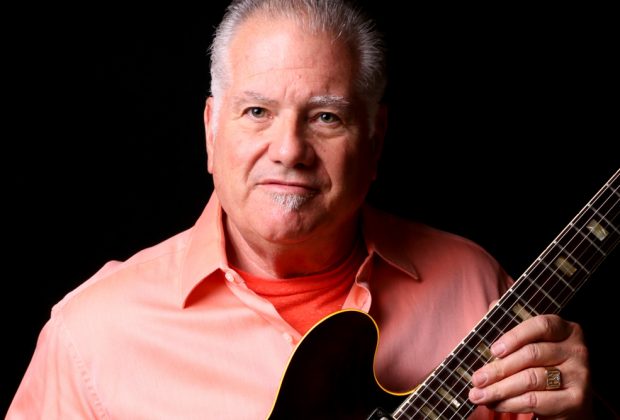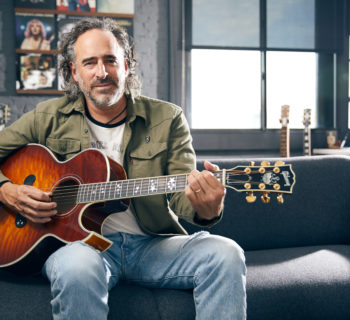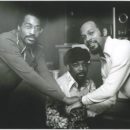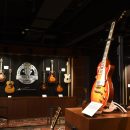Norman Harris is the Indiana Jones of guitars. If one is rare but rumored to exist, he will hunt it down until he finds it. That’s his mission and the motive behind his store, Norman’s Rare Guitars, in Tarzana, CA.
Specializing in rare and vintage instruments, his clientele includes superstars, celebrities and a special breed of humanity that likes to browse and play the most amazing guitars on earth. His store is so popular it has its own clothing line. You can purchase “Norm’s Lucky Brand” shirt from Forgetting Sarah Marshall, or the infamous “Norman’s Rare Guitars” tee that Nigel Tufnel wore in This is Spinal Tap.
Recounting a life way cooler and colorful than most, Harris has written a new book about his adventures: Confessions of a Vintage Guitar Dealer: The Memoirs of Norman Harris. It details his passion for guitars and has some of the best stories about musicians you’re likely to hear. It’s so engrossing, Music Connection caught up with this guitar aficionado to see what makes him tick.
Music Connection: You’ve been dealing in guitars for 40 years. Is it still a thrill?
Norman Harris: The thrill never goes away. There’s always something, a rare custom guitar or a hard-to-find model, that still excites me.
MC: Why write a book?
Harris: Well, I published a book about 10 years ago, Norman’s Rare Guitars, but it was a picture book. I could have included stories, but I didn’t think anyone cared. Then I discovered that people liked to hear the stories and even asked about them. So, I decided to tell my story and the stories behind the guitars.
MC: You came to Los Angeles to be a musician.
Harris: Little Richard brought my band out here and we were signed to a small deal. Plan A was to become a professional musician. Plan B was selling guitars for extra money. Although I did well as a player, Plan B took off and became Plan A.
MC: You got a shout-out in the movie This is Spinal Tap. How did that happen?
Harris: Christopher Guest (who played Nigel) is a regular customer. He told me about the film and wanted to use the store in a few scenes. He also wore one of my T-shirts in the movie. I watched them shoot and it was total fun.
MC: Do you get involved with a lot of films?
Harris: It never occurred to me to do that, but then I was asked to and it was great PR and brought in additional income. The first film I did was Bound for Glory. David Carradine (who played Woody Guthrie) wanted a period correct guitar. Now, I supply guitars and accessories for films and videos whenever needed.
MC: Why aren’t you located in Hollywood where all the action is?
Harris: I didn’t want to be in the middle of all the craziness. Besides, the store is close to my house and it’s a place where professional musicians, rock stars and celebrities can browse without being bothered by paparazzi.
MC: In your book you describe guitars, ones that you had never seen, in exquisite detail. How did you acquire that knowledge years before the Internet?
Harris: A lot of it was word-of-mouth. I established friendships with old players and picked their brains. I also nurtured relationships with people who worked at guitar companies. I just talked, listened and learned.
MC: What makes a guitar vintage?
Harris: Vintage indicates a certain year or era. For example, Fender’s prime era was the ‘50s and ‘60s, while Martin’s was the ‘30s and ‘40s. Almost every prominent guitar company enjoyed a certain period when they were the best. But, vintage doesn’t always mean valuable. “Rare” is valuable because supply and demand determine price.
MC: Are newer guitars better or not?
Harris: They’re different…Some of the reissues are very good. Actually, the Beatles caused guitar manufacturing to suffer. They made guitars so popular, companies started mass producing them and cutting corners to keep up with demand. As a result, standards were lowered and the craftsmanship that made those guitars great started to slide.
MC: You have quite a personal collection. Any guitars you wouldn’t sell?
Harris: I have over 700 guitars in a warehouse. When I started, nobody was preserving them and I was their guardian. Now, I’m 67 years old and it’s time to let someone else do it. So, I would probably sell most of my collection and only keep a few personal favorites.
MC: Did you ever think about doing a reality show?
Harris: I’ve been offered many chances, but I don’t want to compromise what I do and how I do it. I also think it might inhibit people if cameras were everywhere.
MC: With all the videos on your website you have a reality show of your own.
Harris: We do have a lot of videos, but we control the content. We also have a very healthy social network that helps us engage with our clientele and fans.
MC: You’re also known for your charity work.
Harris: I support the Midnight Mission. It’s a crime that people are hungry and sleeping on the streets. So, I produce benefit concerts and invite my friends (e.g. Richie Sambora, Joe Bonamassa and Tom Petty) to perform. A hundred percent of the proceeds go to the Mission.
MC: What’s the “Holy Grail” item you’re looking for now?
Harris: Rare guitars intrigue me–if only two or three exist, and no one’s seen them for a long time, those guitars become my obsession.
MC: Is it true that you blew a deal with George Harrison?
Harris: I still regret it. George was looking for a sunburst late-‘50s cherry-red Les Paul. He ended up buying a couple Les Pauls and a few other instruments. He offered to trade his Gretsch Country Gentleman that he played with the Beatles, but I turned him down. I didn’t think a Gretsch would sell and I thought no one would believe that I had George Harrison’s guitar. That was the biggest deal–ever—that got away from me.
For more information, go to normansrareguitars.com.













